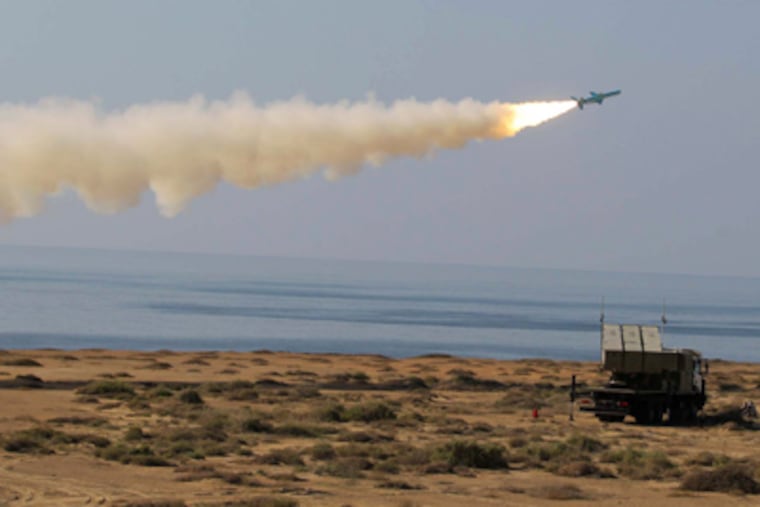Iran's navy tests a cruise missile
TEHRAN, Iran - Iran test-fired a surface-to-surface cruise missile Monday in a drill its navy chief said proved Tehran was in complete control of the strategic Strait of Hormuz, the passageway for one-sixth of the world's oil supply.

TEHRAN, Iran - Iran test-fired a surface-to-surface cruise missile Monday in a drill its navy chief said proved Tehran was in complete control of the strategic Strait of Hormuz, the passageway for one-sixth of the world's oil supply.
The 10-day naval maneuvers, which were scheduled to end Tuesday, were Iran's latest show of strength in the face of international criticism over its nuclear program. Tehran has threatened to close the strait as retaliation for new U.S. economic sanctions.
The missile, called Ghader ("Capable" in Farsi), was described as an upgraded version of one that has been in service before. The official IRNA news agency said the missile "successfully hit its intended target" during the exercise.
An earlier version of the same cruise missile had a range of 124 miles and could travel at low altitudes. There were suggestions it could counter the U.S. naval presence in the Persian Gulf.
French Foreign Ministry spokesman Bernard Valero said in a regular online briefing Monday that France "regrets the very bad signal to the international community sent by the latest missile tests announced by Iran."
There have been conflicting comments from Iranian officials over Tehran's intentions regarding the Strait of Hormuz, and U.S. warnings against any move to close it.
"The Strait of Hormuz is completely under our control," Iran's navy chief Adm. Habibollah Sayyari said after Monday's test. "We do not allow any enemy to pose threats to our interests."
Israeli Defense Minister Ehud Barak said the Iranian exercise was a show of strength intended "to deter the world from continuing sanctions against it."
Barak said at a party meeting in Jerusalem that he doubted Iran would close the strait because that would only bring harsher sanctions.
Israel considers Iran a threat due to its nuclear and long-range missile program. Iran is also a major backer of Hamas and Hezbollah militants who are fighting Israel.
The West fears that Iran aims to develop nuclear weapons - a charge Tehran denies, insisting its program is for peaceful purposes only.
President Obama has signed a bill that applies penalties against Iran's central bank in an effort to hamper Tehran's ability to fund its nuclear enrichment program. But the administration is looking to soften the effect of those penalties because of concerns that they could lead to a spike in global oil prices or cause economic hardship to U.S. allies that import petroleum from Iran. The penalties do not take effect for six months, and the president can waive them for national security reasons.
The latest version of the Ghader missile was delivered in September to the naval division of Iran's Revolutionary Guard. At the time, Tehran said it was capable of destroying warships.
State TV showed video of the launch of two missiles, which it said could hit targets hundreds of miles away. The broadcast said two more shorter-range missiles were also tested.
On Sunday, Iran test-fired an advanced surface-to-air missile called Mehrab ("Altar"), which was described as a medium-range weapon.